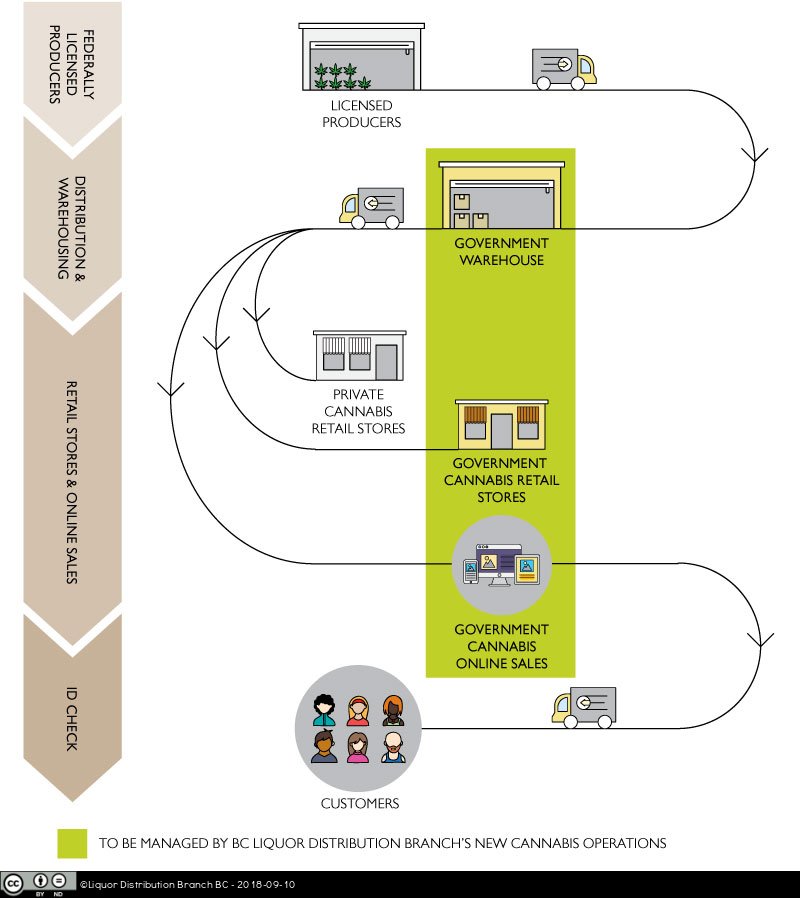
What You Should Know About Cannabis Legalization in BC (Part 1 of 3): Private Retailers
On October 17th, cannabis will become legal for sale and consumption in Canada. In BC, private and government retailers will be able to sell cannabis purchased from licensed producers in a variety of forms. This post is the first in a three-part series about cannabis legalization in BC. For part two on For-Profit Production, click here. For part three on Consumers and Education, click here.
Cannabis is a booming business in Canada already, and is projected to sell $8.6 Billion CAD will be sold to both medical and recreational users by the end of 2018, and it is expected to increase to $9.2 billion CAD by 2025 (INTERNATIONAL: Cannabis sector investment is rising, 2018), a growth of 29% per year (Sayler, 2018). While current industry profit margins are negative as companies establish themselves and the infrastructure needed for the new industry (Sayler, 2018), the biggest cannabis companies are valued at well over a billion. Those companies include Canopy Growth Corporation, Aurora Cannabis Inc., Aphria Inc., and Cronos Group Inc. (Sayler, 2018; Daily Hive Staff, 2018). The cannabis industry is going to be highly competitive, with the number of companies in the industry expected to increase at 35.4% per year for the next five years (Sayler, 2018). In BC, the Minister of Public Safety and Solicitor General of British Columbia, Mike Farnworth, estimates the cannabis industry will take 2-3 years to mature (Zussman, 2018).
This series will review some of the most important laws and projections for this industry in BC and Canada. It is important to note that regulations around the retailing and production of cannabis will vary by municipality and Indigenous Nation and that some portions of the provincial licensing rules are not yet complete.
Private Retailers:
When the newly renamed Liquor & Cannabis Regulation Branch (LCRB) begins selling cannabis from its government approved distribution point to retailers in October, there will be more that 150 strains from 31 licensed producers to choose from (Potenteau, 2018). At this point in time, one government operated store will open in Kamloops on October 17th (Zussman, 2018). Although approximately 100 private retailer applications are being processed, it is unknown whether their permits will be approved by the legalization date (Zussman, 2018; Little, 2018).
Additional rules that private retailers should be aware of include:
- No company or individual can own more than 8 stores, with an owner being defined as someone controlling 20% of a retail operation. (Korstrom, 2018)
- Cannabis accessories can also be sold. (Potenteau, 2018)
- Retail stores can sell dried cannabis, cannabis oil, cannabis seeds, and cannabis accessories. (Cannabis retail store terms and conditions: A handbook for the sale of non-medical cannabis in British Columbia, 2018)
- Retailers must purchase cannabis from the Liquor Distribution Branch (LBD), but cannabis accessories can be purchased from other sources (Cannabis retail store terms and conditions: A handbook for the sale of non-medical cannabis in British Columbia, 2018)
- Private retailers are not permitted to have online sales or to sell edibles. (Cannabis retail store terms and conditions: A handbook for the sale of non-medical cannabis in British Columbia, 2018)
- Minors cannot enter retail stores. (Cannabis retail store terms and conditions: A handbook for the sale of non-medical cannabis in British Columbia, 2018)
Those who currently own dispensaries must also go through the application process and will need to clear any illegal product on their shelves and restock with cannabis from the LBD (Courtenay, 2018). They should also be aware that a new enforcement branch called the Community Safety Unit will begin seizing illegal cannabis and will not need a warrant (Little, 2018). If you have further questions or want to be involved in advocating for the industry, you may be interested in contacting the Cannabis Commerce Association of Canada, which represents both producers and retailers. If you are interested in knowing more about the locations and numbers of retailers or dispensaries in your area currently, Weedmaps provides an interactive map of Canadian cannabis retailers or dispensaries, along with business reviews.
Indigenous Nation Rights:
Those who wish to open a non-medicinal cannabis store on Indigenous land must gain permission from the Indigenous Nation. The Indigenous Nation can:
- Choose not to recommend approval of private cannabis stores.
- Impose location restrictions.
- Limit the hours of operation for the store.
- Charge fees for assessing the store’s application.
(Liquor and Cannabis Regulation Branch, n.d.)
If the Nation decides to consider the application, it must gather and consider the views of area residents and provide the recommendation of approval or rejection in writing to the LCRB. A positive recommendation is required for licensing approval from the LCRB. Please see the Indigenous Nations’ Role in Licensing Non-Medical Cannabis Retail Stores pdf for more information.
These rights are nearly identical to the rights of local governments in regulating cannabis retailing and production (Liquor and Cannabis Regulation Branch, n.d.).
Are you planning to enter or already a part of this new industry? Let us know what you think of the laws and the impact they will have on your business down below, or tweet us @sba_bc. We look forward to hearing from you!
For part two on For-Profit Production, click here.
Photo credit: BC Liquor Distribution Branch. Attribution required, no derivatives permitted.



